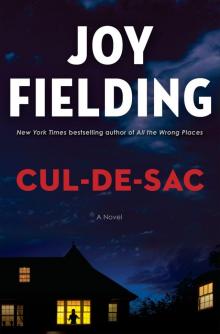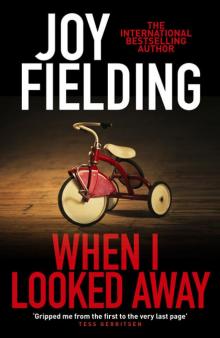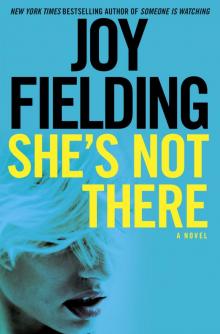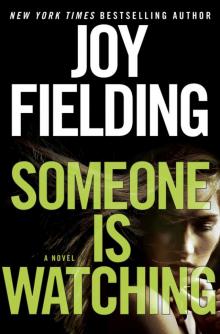- Home
- Joy Fielding
Still Life Page 4
Still Life Read online
Page 4
“Don’t be. I know how much you love her.”
“Did you know she was my maid of honor?” Gail asked, continuing before Warren could respond. “I married Mike right out of high school, if you can believe it. I was eighteen. Eighteen, for God’s sake. A baby. Mike was ten years older, and he’d just been diagnosed with leukemia. Everybody told me I was gonna ruin my life, that I was crazy to marry him. Everybody except Casey. She said, ‘Go for it.’ “Again, Gail’s voice was lost in a series of soft sobs.
“She’s going to get better, Gail.”
“You promise?” Gail asked, echoing Casey’s silent question.
But before Warren could answer, there was a sudden flurry of activity. Casey heard the pushing open of a door, the approach of several pairs of sturdy shoes, multiple voices. “I’m afraid we’re going to have to ask you to leave for a few minutes,” a female voice announced. “We have to give the patient a sponge bath, adjust her position so she doesn’t get bedsores.”
“We shouldn’t be more than ten, fifteen minutes,” a second, higher-pitched voice added.
“Why don’t we go get something to eat in the cafeteria,” Gail suggested.
“All right,” Warren agreed.
Casey heard the reluctance in his voice even as she felt him being drawn from the room.
“Don’t worry, Mr. Marshall,” the first nurse told him. “Patsy and I will take good care of your wife.”
“I’ll be back soon, Casey,” Warren said.
Casey thought she felt him move close, lean in, maybe even pat her hand under the bedsheet. Was she just imagining it?
“Now, that is one lovely man,” Patsy proclaimed, her voice dropping half an octave as the door shut behind them. “My heart really goes out to him.”
“Yeah. I sure wouldn’t want to be in his shoes,” the other nurse said. “Speaking of which, did you happen to check hers out?”
“What? No, Donna. I can’t say that I did.”
“Very classy. Very expensive.”
“I didn’t notice. Okay, Mrs. Marshall,” Patsy said, returning her attention to Casey. “Let’s get you all cleaned up for that handsome husband of yours.”
Casey heard the rustle of sheets, and although she felt nothing, she’d never felt more exposed. Was she wearing a hospital gown or a nightgown from her own closet? Was she wearing anything at all? Were they touching her? Where exactly?
“Just how long do you think he’s going to stick around anyway?” Donna was saying, echoing Casey’s earlier thoughts. “Soon as he realizes she’s not going to get any better….”
“Ssh. Don’t say that,” Patsy admonished.
“What? She can’t hear me.”
“You don’t know that for sure. She opened her eyes, didn’t she?”
“That doesn’t mean anything. I heard one of the doctors talking. He said that when they open their eyes, it’s often a bad sign. It could signify the beginning of a profound vegetative state.”
“Well, let’s hope they’re wrong.”
Casey wondered what Donna and Patsy looked like, picturing one tall and fair, the other short and dark. Or maybe tall and dark, she theorized, her mind exchanging one set of features for another, alternating different heads on different body types. One minute, she pictured Nurse Patsy with Dolly Partonesque breasts, and Donna as flat as the proverbial pancake. Or maybe Patsy was a redhead. Maybe Donna’s skin was a soft, velvety black. Whatever they looked like, they were right about one thing: Warren Marshall was one handsome man.
Casey laughed, knowing they couldn’t hear her. To them she was an inanimate object. No more, no less. A body to be rotated regularly so that it didn’t develop bedsores, and washed, so that it didn’t start to smell. An uninteresting piece of still life. That’s what I’ve become, she thought, her laugh drying up, dissolving in her throat.
“Oh, look at her face,” Patsy said suddenly.
“What’s the matter with it?” Donna questioned.
“She just looks so sad all of a sudden.”
“What are you talking about?” Donna asked.
“You don’t think her eyes look sad?”
“I think her eyes look open. Period. Okay, I’m done with her front. You want to help me turn her on her side?”
Casey felt her body being manipulated, her head placed at a different angle, although she couldn’t be sure if this was really happening or just part of her imagination.
“Okay, I’m finished,” Donna said after several more minutes passed. “What about you?”
“I think I’ll stick around a little while, brush her hair, make her look nice. You don’t have to stay.”
“Suit yourself.”
“We’ll just get you all prettied up for that handsome, devoted husband of yours,” Patsy said as Donna left the room. Casey imagined her gently running a brush through her hair. “Although, you gotta wonder,” she continued, her voice shedding its softness with the closing of the door, like a snake shedding its skin. “I mean, he is a man, after all. A drop-dead gorgeous man at that. Not to mention a very rich, drop-dead gorgeous man. You gotta figure the girls are already lining up around the block. And he has an eye for the women, your handsome hubby does.” Casey imagined Patsy putting down the brush and leaning forward to whisper in her ear. “I know ’cause I caught him checking out my ass.” She laughed. “How long do you think it’ll take me to get him into bed?” She laughed again. “What? You don’t believe I can do it? Wanna bet? How much? Ten bucks? A hundred? Hell, let’s make it a thousand. You can afford it.”
The door opened. “Patsy,” Donna called from the doorway. “They need us in 307.”
“Sure thing,” Patsy responded cheerily. “I’m done here.”
FOUR
She was three years old when she found out that the beautiful lady with the waist-length rush of natural blond hair that smelled of bubble gum and cotton candy was her mother and not just a mysterious woman named Alana who always had a glass in her hand, and who slept in her father’s bed.
“Here, Casey, sweetheart. Can you take this drink upstairs to your mama? I’m on the phone with the cable company, and they’ve got me on hold.”
“My mama?” the child asked. Who was Maya talking about? Maya hadn’t been living with them very long. It was possible she still didn’t know everyone.
“The pretty blond lady who’s married to your father?” Maya said, as if Casey should know. “The one who stays in bed all day?” she added with a laugh. Then immediately, her normally pale complexion reddening: “Don’t you dare tell your mother I said that.”
Casey took the glass of clear liquid from Maya’s outstretched hand and raised it to her nose. “What is it?”
“Water.”
Casey lifted the glass to her mouth.
Maya quickly snatched the glass back. At just under six feet tall, she was an imposing young woman whose dark eyes brooked no argument. “What are you doing?”
“I’m thirsty.”
“I’ll get you your own drink.” Maya was instantly at the sink, the phone pressed between her shoulder and her ear as she poured Casey a small glass of tepid water.
“Why can’t I have some of that water?” Casey pointed with her chin to the other glass Maya was holding. It was nice and cold and even had a few ice cubes floating across its surface.
“Because it’s not good to drink from anybody else’s glass,” Maya said firmly.
Even at the tender age of three, Casey knew she was being lied to. Just as she knew Maya was making up what she’d said about the beautiful woman upstairs in her father’s bed being her mother. Not that Casey knew what a mother was exactly. Her only experience with mothers had come at the park a few weeks earlier, when a woman with messy brown hair and faded, baggy jeans had perched herself on one corner of the sandbox and begun playing with a little boy whose nose was covered with a series of big orange spots that Maya had later identified as freckles.
“You’re new around here,” Maya had sai
d to the woman, leading Casey over to the sandbox and sitting down, then striking up a conversation as easily as if she’d known the woman all her life.
“Yes. We just moved in last week. Still discovering the neighborhood.” The woman reached out her hand for Maya to shake. “I’m Ellen Thomas. And this is Jimmy.”
“Nice to meet you. And you, too, Jimmy,” Maya said to the little boy, who was too busy digging in the sand to acknowledge her greeting. “I’m Maya, and this is Casey. She was named after Casey Stengel.”
Ellen Thomas smiled, exposing a top row of uneven teeth. “Her father is obviously a baseball fan.”
“Oh, you just name a sport. Mr. Lerner is into it. So who do you work for?” Maya asked in the next breath.
Ellen Thompson looked puzzled. “Oh, I’m not Jimmy’s nanny. I’m his mother.”
“Really?” Maya sounded very surprised. “That’s very unusual in this neck of the woods.”
Casey’s eyes immediately shot toward the trees surrounding the acres of parkland, trying to figure out where their necks were located, when Maya dropped another bombshell.
“I think you’re the first actual mother I’ve ever seen in this park,” she said.
“What’s an ‘actual mother’?” Casey asked later, struggling to keep up with her nanny as they made their way up the rolling hill toward her home. Maya laughed and said nothing, so Casey let the question die, having already decided from watching Ellen Thomas for the better part of an hour that actual mothers were women with messy brown hair and crooked teeth, who played with little boys in sandboxes.
The woman who slept in her father’s bed couldn’t be an actual mother. She had sweet-smelling yellow hair she was always combing, and perfectly straight, white teeth. Casey was quite certain she’d never set foot in a sandbox because she rarely left her room, and when she did, it was at night, when the park was closed. “Come kiss Alana good night,” her father would instruct as they prepared to go out for the evening, and Casey would happily oblige.
“You look pretty,” she’d say to the woman offering up her smooth cheek to be pecked. Once Casey had made the mistake of throwing her arms around the woman’s neck and burrowing her nose into her soft, candy-scented hair, and the woman had gasped and quickly pushed her aside.
“Watch the hair,” she’d cautioned, and Casey had spent the next minute studiously observing the woman’s hair, waiting to see what it would do. “What’s the matter with that child?” the woman named Alana had demanded of Casey’s father as they were walking out the door. “Why is she always looking at me like that?”
“What are you waiting for?” Maya was asking now. “Take this upstairs.” Once again, she deposited the cold glass in Casey’s hand. “Careful you don’t spill any of it. And don’t take a sip. You understand?”
Casey nodded, walking slowly toward the giant circular staircase in the middle of the main foyer. It was very quiet in the house that day. She’d heard Maya complaining on the phone earlier that the housekeeper had called in sick that morning, and so she was being forced to pull down double duty as chief cook and bottle washer—although Casey hadn’t seen Maya washing any bottles, she thought as she slowly made her way up the green-and-beige-carpeted stairway. A drop of clear liquid tumbled out of the glass and onto the back of Casey’s hand, and she quickly licked it up before it could fall to the floor. It tasted bitter, like medicine, and Casey made a face, wondering if Alana was sick and that was why she wasn’t supposed to drink from her glass.
She knocked gently on the bedroom door.
“It’s about time,” the woman inside snapped. “What the hell have you been doing all morning?”
Casey stepped inside. The woman named Alana was sitting up in her dark oak four-poster bed, surrounded by white lace pillows. The heavy brocade curtains were open at one end of the room and closed at the other, making the large bedroom appear vaguely lopsided. Alana was wearing a pink negligee and her hair, secured by a wide, pink headband, fell past her shoulders to graze the exposed tops of her breasts.
“Oh,” she said. “It’s you.”
“I have your water.” Casey extended the glass toward her.
“Well, bring it over here. Do you think my arms are eight feet long?”
“Are you sick?” Casey handed the glass to Alana, watching her take a long sip.
Alana peered at Casey over the top of her glass and continued drinking. She said nothing, not even “Thank you.”
“Are you my mother?”
“What?”
“Are you my mother?”
“Of course I’m your mother. What’s the matter with you?”
Casey and her mother exchanged worried looks.
“Don’t ever call me that in public,” Alana instructed.
Casey didn’t know what “in public” meant, but she was afraid to say so. “What should I call you?” she asked instead.
Her mother finished the remaining liquid in her glass in one long swallow. Then she pushed away her blankets and swung her feet off the bed, leaving Casey’s question unanswered. “Help me to the bathroom,” she said.
“You’re fat!” Casey exclaimed with a giggle, noting her mother’s expanded, round belly as she climbed out of bed.
“Don’t be a smart-ass.”
Casey took her mother’s hand and led her toward the en suite pink marble bathroom. “What’s a smart-ass?”
“It’s little girls who say stupid things.”
Casey wasn’t sure what she’d said that was so stupid, but she felt stung by her mother’s rebuke, so she said nothing further.
Alana proceeded to throw up in the toilet, then she returned to her bed. “Send Maya up with another drink,” she said, before pulling the rose-pink blankets up over her head.
“Your mother’s going to have a baby,” Maya explained later. “I don’t think she’s too happy about it.”
“Why not?”
“I don’t think motherhood’s exactly her thing.”
“What’s her thing?” Casey asked, not sure what they were talking about, as was often the case when she talked to Maya. Still, Maya was the only adult in the house who regularly paid her any attention at all, so Casey hoped the question wasn’t too stupid. She didn’t want Maya to think she was a smart-ass.
“Your mother is a very complicated woman,” Maya said, refusing to elaborate.
“I wish you were my mother,” Casey told her.
And then suddenly, Maya was gone, replaced soon after by the not-so-dynamic duo of Shauna and Leslie, the former a dark-haired teenager from Ireland, whose job it was to tend to Casey, and the latter a bosomy ex-barmaid from London who was supposed to be looking after the new baby, but who spent more time looking after Casey’s father. Leslie was quickly replaced by Rosie, the daughter of their Portuguese gardener. She, too, spent more time ministering to Casey’s father than she did to Casey’s baby sister, and she, too, soon disappeared, to be replaced by Kelly, then Misha, and finally Daniela.
“Your father’s a lot older than your mother,” Shauna remarked one day as she was walking Casey to her pricey private preschool three blocks away.
“Seventeen years,” Casey elaborated. She wasn’t sure how she knew this, but she did. Probably she’d overheard grown-ups whispering none-too-quietly above her head, as if she weren’t there. That was how she learned most of the things she knew. For example, that was how she knew her father had been disappointed his second child had turned out to be “another stinking girl,” to quote the short-lived Leslie, and how she knew her mother had undergone an operation to make sure she didn’t have any more. It was from Kelly she’d found out her father was a “scoundrel” who “screwed anything that moved,” and from Misha that her mother was something called a “trophy wife,” and that they were “filthy rich,” despite the fact they bathed every day.
“You wouldn’t think someone in a coma could get so dirty,” Casey heard someone say now, the remark jolting her out of her reveries. How long had she
been asleep?
“It’s just dead skin,” another voice said, and Casey recognized the voices as belonging to Donna and Patsy. Hadn’t they just bathed her? How long ago was that? Hadn’t they just left?
“Where’s your handsome husband today?” Donna asked her, almost as if she expected an answer.
“I haven’t seen him in two days,” Patsy said, answering for her.
Two days? Casey repeated silently. Two days? She’d lost two days?
Better than lying here day after endless day, she acknowledged. Although her days were better than her nights, she thought. At least the days were filled with activity—people coming in and out, fussing over her, discussing her condition, adjusting her tubing, gossiping about assorted friends and celebrities. Nights, on the other hand, were mostly silent, punctuated only by the occasional laugh from the nurses’ station or a cry from a nearby room.
Dead air mostly, she thought, a wave of depression washing over her as the hopelessness of her condition reasserted itself, and her panic returned. “This can’t be happening,” she screamed silently. “It can’t be real. Please, somebody help me. Get me out of here. I can’t live this way. I don’t want to live this way. Just pull the plug. Disconnect the machines. Do something to end this torment. Please. You have to help me.”
“Careful of the tube in her neck,” Patsy said.
“What’s that for?”
“Something they put in to help her breathe.”
Okay, calm down. Calm down, Casey told herself, realizing the doctors must have performed the tracheostomy, and finding it almost comic that even now, a quarter of a century removed from her childhood, she was still getting most of her information from adults talking above her head, as if she weren’t there.
“It’s not the most attractive thing in the world,” Donna said.
“I don’t think anybody’s too concerned with the way it looks,” Patsy admonished, managing to sound as if she really cared.
Was it possible, Casey wondered, that she’d imagined the earlier scene with Patsy, that the young woman hadn’t said any of those hateful things?

 The Stranger Next Door
The Stranger Next Door Cul-de-sac
Cul-de-sac The Final Act
The Final Act When I Looked Away
When I Looked Away She's Not There
She's Not There All the Wrong Places
All the Wrong Places Now You See Her
Now You See Her Don't Cry Now
Don't Cry Now Good Intentions
Good Intentions Still Life
Still Life Lost
Lost The First Time
The First Time Whispers and Lies
Whispers and Lies The Other Woman
The Other Woman Charley's Web
Charley's Web Mad River Road
Mad River Road Puppet
Puppet Life Penalty
Life Penalty The Wild Zone
The Wild Zone Home Invasion
Home Invasion Someone Is Watching
Someone Is Watching Heartstopper
Heartstopper See Jane Run
See Jane Run The Bad Daughter
The Bad Daughter Shadow Creek
Shadow Creek Missing Pieces
Missing Pieces Kiss Mommy Goodbye
Kiss Mommy Goodbye Grand Avenue
Grand Avenue